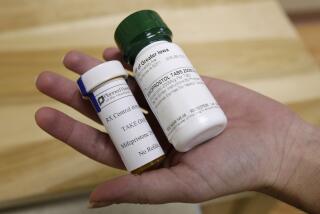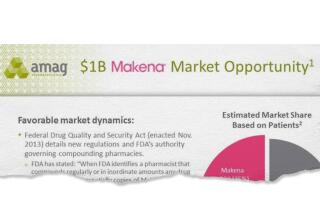Drug to prevent preterm birth pulled from market, years after it was shown ineffective

- Share via
A pharmaceutical company selling the only drug approved to prevent preterm birth said that it would withdraw the medicine from the market.
Covis Pharma said Tuesday it told the U.S. Food and Drug Administration that it would voluntarily remove the medicine called Makena, which a study in 2019 showed did not extend pregnancies.
“While we stand by Makena’s favorable benefit-risk profile, including its efficacy in women at highest risk of preterm birth, we are seeking to voluntarily withdraw the product and work with the FDA to effectuate an orderly wind-down,” Raghav Chari, the company’s chief innovation officer, said in a statement.
The Times detailed in a February 2022 investigation how Covis and the companies that previously owned the rights to Makena profited by taking a cheap, decades-old medicine with questionable effectiveness and safety and securing FDA authorization for its use.
The agency approved Makena 12 years ago despite limited evidence that it worked and objections from an agency scientist.
The FDA had asked Covis, a Luxembourg company owned by private equity firm Apollo Global Management, to pull the drug in 2020 after the study’s negative results were announced. The company refused.
The drug Makena doesn’t reduce the risk of preterm birth, a study found, and the FDA recommended it be taken off the market. Its maker has refused.
Instead the company, relying on complex federal regulations, asked the FDA to hold a hearing on its request to remove Makena from pharmacies.
At the hearing, not held until October 2022, a committee of experts voted 14 to 1 that sales of the drug should end because of the lack of scientific proof that it reduced the risk of preterm birth. The condition is a leading cause of infant death.
At the same time, Makena, a synthetic hormone, has a plethora of documented side effects, including depression and hypertension. The FDA says that the drug’s possible long-term adverse effects on women and their children are still unknown.
Doctors continue to prescribe Makena, and it is not clear when prescriptions may end. FDA scientists said in a document released late Tuesday that Makena should be immediately withdrawn because it has no benefit and “exposes patients only to risks.”
Covis said it had proposed to the FDA soon after the October hearing that the drug be withdrawn over a period of months that would allow patients taking Makena to finish their 21-week course of weekly injections. The company said the FDA disagreed with that proposal.
The agency said there was no evidence that women who had already begun the series of shots would be harmed by immediately discontinuing them.
The final decision on Makena’s fate will be made by FDA Commissioner Robert Califf and the agency’s chief scientist.
The case has shined a light on regulations that allow the FDA to accelerate approval of drugs not backed by the scientific evidence the agency otherwise requires. The rules have been criticized for letting companies profit from expensive medicines that are never proved to help patients.
More to Read
Inside the business of entertainment
The Wide Shot brings you news, analysis and insights on everything from streaming wars to production — and what it all means for the future.
You may occasionally receive promotional content from the Los Angeles Times.












